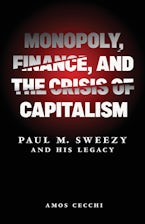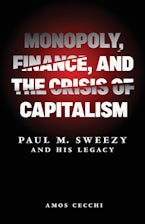Monopoly, Finance, and the Crisis of Capitalism is the first-ever biography of the scholar who brought Marxian theory to the English-speaking world. Paul M. Sweezy was one of the greatest political economists of the twentieth century. Born in 1910, his upbringing during the Depression deepened his understanding of capitalism, especially its tendency toward stagnation—the inability of capitalist economies to generate sufficient capital investment to make use of abundant resources, much less produce a harmonious social order. During the Second World War Sweezy taught at Harvard, and doubled as an intelligence officer—until it became clear that his political views would prohibit a future in any mainstream arena. Leaving Harvard, in the midst of the Red Scare, Sweezy boldly co-founded what is North America’s most distinguished and enduring Socialist magazine, Monthly Review, where he remained until his death in 2004.
In Amos Cecchi's Monopoly Finance and the Crisis of Capital—published for the first time in English—readers are given a comprehensive examination of Sweezy’s massive body of work prior to, and throughout, his many decades at Monthly Review. Each of Sweezy’s major works is given a careful reading, from his seminal interpretation of Marxian economics, The Theory of Capitalist Development, to his pathbreaking study of the impact of monopolized markets, Monopoly Capital, written with Paul Baran, to his pioneering analysis of the financialization of capitalism, written with Harry Magdoff. Cecchi also explores the various exchanges Sweezy had with other political economists, along with those who influenced his thinking, including Maurice Dobb, Charles Bettelheim, Rudolf Hilferding, Thorstein Veblen, John Maynard Keynes, and Josef Steindl—as well as several of the political economists who were, in turn, greatly influenced by Sweezy. Throughout, the author highlights the importance and timeliness of Sweezy’s open and creative Marxist approach particularly in terms of his view of “the present as history.”


